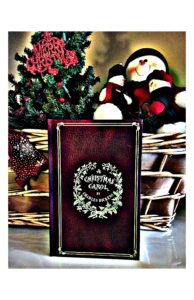 Before the warmth of Christmas generosity and good will is chilled by the frenetic pace of another year, I thought it appropriate to share what I expect is a scarcely known excerpt from Charles Dickens’ classic A Christmas Carol. If it is not scarcely known, then in my humble estimation its potency to prevail upon us Good is almost certainly too scarcely applied.
Before the warmth of Christmas generosity and good will is chilled by the frenetic pace of another year, I thought it appropriate to share what I expect is a scarcely known excerpt from Charles Dickens’ classic A Christmas Carol. If it is not scarcely known, then in my humble estimation its potency to prevail upon us Good is almost certainly too scarcely applied.
I’ve seen nearly every movie version of Dickens’ classic tale, but it wasn’t until this year that I decided to read the book. I’m always moved by the overall story of redemption, but I was especially affected by one particular passage in the book, the message of which is largely lost in Hollywood’s adaptations.
Scrooge is with the first of his three spectral escorts, the Ghost of Christmas Past. He has just finished watching his former self and fellow apprentice, Dick Wilkins, make merry at his old master Fezziwig’s annual Christmas Eve party. The following excerpt left its mark on me, almost as if it were a branding iron:
During the whole of this time, Scrooge had acted like a man out of his wits. His heart and soul were in the scene, and with his former self. He corroborated everything, and underwent the strangest agitation. It was not until now, when the bright faces of his former self and Dick were turned from them, that he remembered the Ghost, and became conscious that it was looking full upon him, while the light upon its head burnt very clear.
“A small matter,” said the Ghost, “to make these silly folks so full of gratitude.”
“Small!” echoed Scrooge.
The Spirit signed to him to listen to the two apprentices, who were pouring out their hearts in praise of Fezziwig: and when he had done so, said,
“Why! Is it not? He has spent but a few pounds of your mortal money: three or four perhaps. Is that so much that he deserves this praise?”
“It isn’t that,” said Scrooge, heated by the remark, and speaking unconsciously like his former, not his latter, self. “It isn’t that, Spirit. He has the power to render us happy or unhappy; to make our service light or burdensome; a pleasure or a toil. Say that his power lies in words and looks; in things so slight and insignificant that it is impossible to add and count ‘em up: what then? The happiness he gives, is quite as great as if it cost a fortune.”
If I could create any position for myself in corporate America, my dream job/title would be CEE (Chief Executive Encourager). And if such a thing were practical — and perhaps it is more so than one might care to acknowledge — I would endeavor to spend at least 50% of my time getting to know people. And I mean really know them; know the names of their spouses, their children, and what they enjoy doing on their days off. I would do my best to create a culture where those who worked for me delighted to see me make my rounds through the office, and hoped that I might stop by their desk for a brief chat. I would labor to build people as much as I labored to build profits. And I would work as hard as I could to instill this same mindset in every manager and executive so that it might spread like a virus throughout the entire organization.
Imagine what such an engaged workforce might accomplish. Imagine if the people in your employ loved you (not simply working for you) so much that their work hardly seemed like work. Imagine if they were so encouraged by your kindness, caring, and recognition for their contributions/accomplishments that they could hardly stand the thought of working for someone else. Imagine what could happen in a culture where people gladly went the extra mile to get things done without even being asked or told. Imagine hearts overflowing with such gratitude that loyalty was expressed daily through a work ethic devoted to repaying your kindness. How much better might that be than having a workforce that feels overburdened and underappreciated?
So whether you sit in the big chair, corner office, or occupy a premier cubicle, consider the power at your disposal. Scrooge observed that his former boss had the power to “. . . render us happy or unhappy; to make our service light or burdensome; a pleasure or a toil.” Scrooge further observed that this power was conveyed through “. . . words and looks; in things so slight and insignificant that it is impossible to add and count ‘em up: what then?”
Yes, what then? How will you wield the power you have in 2019 and beyond?
To those people who work for you, “the happiness [you give], is quite as great as if it cost a fortune.”



